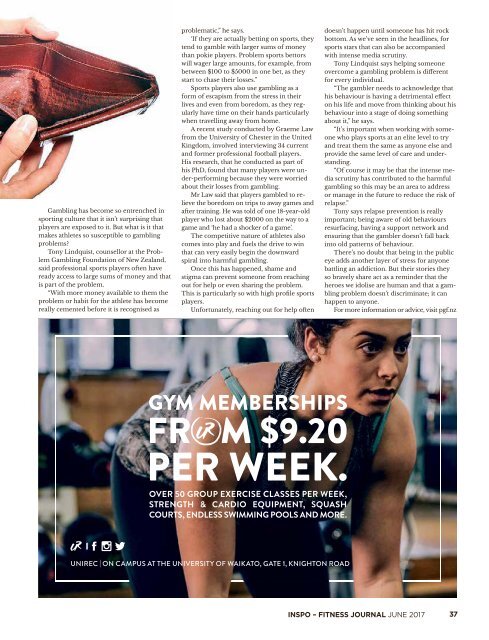INSPO Fitness Journal June 2017
Everything from nutrition, beauty, home and workplace wellbeing to health, performance – and so much more.
Everything from nutrition, beauty, home and workplace wellbeing to health, performance – and so much more.
Create successful ePaper yourself
Turn your PDF publications into a flip-book with our unique Google optimized e-Paper software.
Gambling has become so entrenched in<br />
sporting culture that it isn’t surprising that<br />
players are exposed to it. But what is it that<br />
makes athletes so susceptible to gambling<br />
problems?<br />
Tony Lindquist, counsellor at the Problem<br />
Gambling Foundation of New Zealand,<br />
said professional sports players often have<br />
ready access to large sums of money and that<br />
is part of the problem.<br />
“With more money available to them the<br />
problem or habit for the athlete has become<br />
really cemented before it is recognised as<br />
problematic,” he says.<br />
‘If they are actually betting on sports, they<br />
tend to gamble with larger sums of money<br />
than pokie players. Problem sports bettors<br />
will wager large amounts, for example, from<br />
between $100 to $5000 in one bet, as they<br />
start to chase their losses.”<br />
Sports players also use gambling as a<br />
form of escapism from the stress in their<br />
lives and even from boredom, as they regularly<br />
have time on their hands particularly<br />
when travelling away from home.<br />
A recent study conducted by Graeme Law<br />
from the University of Chester in the United<br />
Kingdom, involved interviewing 34 current<br />
and former professional football players.<br />
His research, that he conducted as part of<br />
his PhD, found that many players were under-performing<br />
because they were worried<br />
about their losses from gambling.<br />
Mr Law said that players gambled to relieve<br />
the boredom on trips to away games and<br />
after training. He was told of one 18-year-old<br />
player who lost about $2000 on the way to a<br />
game and ‘he had a shocker of a game’.<br />
The competitive nature of athletes also<br />
comes into play and fuels the drive to win<br />
that can very easily begin the downward<br />
spiral into harmful gambling.<br />
Once this has happened, shame and<br />
stigma can prevent someone from reaching<br />
out for help or even sharing the problem.<br />
This is particularly so with high profile sports<br />
players.<br />
Unfortunately, reaching out for help often<br />
doesn’t happen until someone has hit rock<br />
bottom. As we’ve seen in the headlines, for<br />
sports stars that can also be accompanied<br />
with intense media scrutiny.<br />
Tony Lindquist says helping someone<br />
overcome a gambling problem is different<br />
for every individual.<br />
“The gambler needs to acknowledge that<br />
his behaviour is having a detrimental effect<br />
on his life and move from thinking about his<br />
behaviour into a stage of doing something<br />
about it,” he says.<br />
“It’s important when working with someone<br />
who plays sports at an elite level to try<br />
and treat them the same as anyone else and<br />
provide the same level of care and understanding.<br />
“Of course it may be that the intense media<br />
scrutiny has contributed to the harmful<br />
gambling so this may be an area to address<br />
or manage in the future to reduce the risk of<br />
relapse.”<br />
Tony says relapse prevention is really<br />
important; being aware of old behaviours<br />
resurfacing, having a support network and<br />
ensuring that the gambler doesn’t fall back<br />
into old patterns of behaviour.<br />
There’s no doubt that being in the public<br />
eye adds another layer of stress for anyone<br />
battling an addiction. But their stories they<br />
so bravely share act as a reminder that the<br />
heroes we idolise are human and that a gambling<br />
problem doesn’t discriminate; it can<br />
happen to anyone.<br />
For more information or advice, visit pgf.nz<br />
OVER 50 GROUP EXERCISE CLASSES PER WEEK,<br />
STRENGTH & CARDIO EQUIPMENT, SQUASH<br />
COURTS, ENDLESS SWIMMING POOLS AND MORE.<br />
UNIREC | ON CAMPUS AT THE UNIVERSITY OF WAIKATO, GATE 1, KNIGHTON ROAD<br />
<strong>INSPO</strong> – FITNESS JOURNAL JUNE <strong>2017</strong><br />
37


















